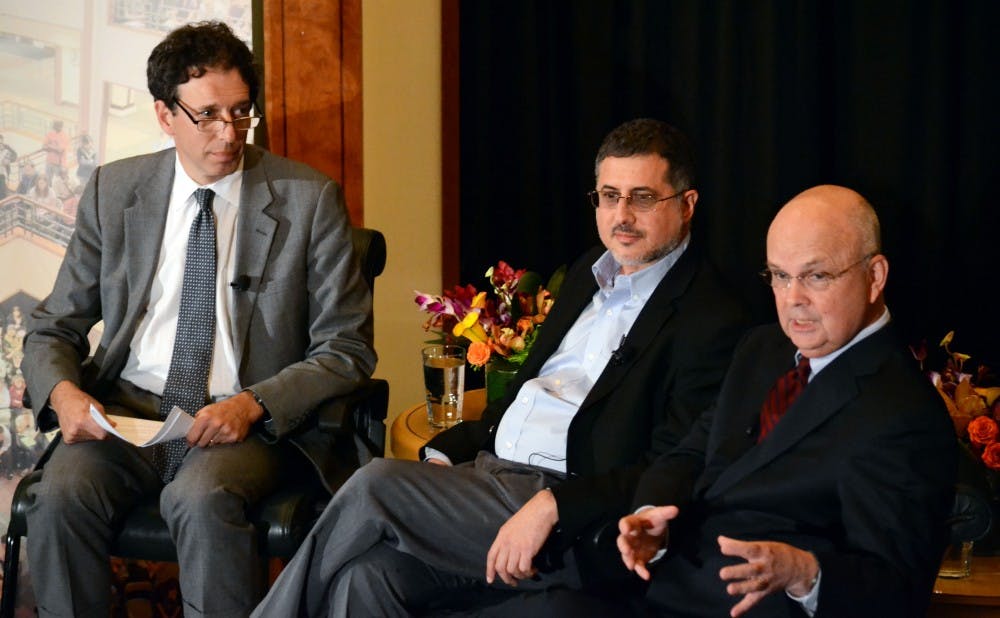Just how much Americans ought to know about their government's national security programs was up for debate Monday night.
At “Leakers or Whistleblowers? National Security Reporting in the Digital Age,” two leading experts on the subject battled it out—Gen. Michael Hayden, former director of the National Security Agency and Central Intelligence Agency, and Barton Gellman, a Pulitzer Prize-winning journalist who has broken many national security stories with information and documents from his source, former defense contractor Edward Snowden. Hayden and Gellman faced off on issues ranging from the exact definition of the term "whistleblower" to the actual risks to citizens' privacy in national security operations.
Gellman discussed the difficulties of reporting national security issues when certain information has to be kept secret from the public. There is a delicate balance between revealing details that are helpful to American citizens but not harmful to the American government, he added.
“The time comes when we have material we are prepared to write about," Gellman said. "We consult the government, we try to understand in some depth what the national security interests are and the things that do more harm than good."
Although the panel did not focus only on information revealed by Snowden, both Gellman and Hayden mentioned the issue to further their arguments, particularly arguing over the motives of Snowden’s actions.
Snowden went through national security files looking for documents to expose, Hayden said, calling him a “hunter” rather than a “gatherer.” Hayden defined a whistleblower as someone working within the government who is given information they are not comfortable keeping classified and so confronts fellow government officials with their discomfort. He added that Snowden did not fit this description.
Gellman, however, refuted Hayden’s point, noting that motive is unimportant in evaluating the content of the documents Snowden leaked.
"My goal is to maximize information available to the public for self-government," Gellman said. "There is no evidence to doubt [Snowden] believed the government and the NSA have accumulated a dangerous amount of power.”
Hayden likened the government's jurisdiction to the lines of a "box" and said each president he had served under—George W. Bush and Barack Obama, respectively—had established those lines specifically with him. He said the system is not without its own checks and balances, citing the United States Foreign Intelligence Surveillance Court and House of Representatives committees as examples of oversight.
He noted that the American public would not
necessarily be able to handle an entirely public government.
"If you want to do this
publicly, we’ll do it publicly and if we fail to defend you, let me show you
the new box you're going to draw in 72 hours," Hayden said, drawing the
lines of an exaggeratedly large box in the air.
These sorts of analogies came as no surprise
to Gellman, who said that he had heard them before from Hayden and current NSA
director Keith Alexander. Gellman noted that Alexander has said he wishes he could have a “huddle” with the American public to speak openly about sensitive issues, and Hayden said he wished he could “whisper
in the ears of 315 million countrymen,” but that if they did this, the information would eventually reach enemies of the United States.
Gellman, however, said leaking national secrets is not the only harm to the government. Officials also fear public scrutiny and criticism of their actions.
Hayden outlined the
specifics of how metadata search operates, describing the “three hop system.”
Often, a phone number of a supposed threat is traced to their contacts, which will are then searched for another round of contacts, effectively
hitting three degrees of separation.
Although Hayden said the nature of this system only looks for contact number rather than content, Gellman noted that the system can still put innocent Americans at risk for surveillance, a phenomenon called “incidental collection.”
The debate brought out a passionate crowd, who occupied not just the Fleishman Commons, where the event was held, but also two separate classrooms with live webcasts of the event.
Some audience members said they were unsure how they felt after the event ended. Chapel Hill resident Maggie Hanes, a former journalist, said she was surprised by the degree of common ground between the two speakers.
“I’m blown away. I was impressed with how thoughtful their answers were," Hanes said. "They’re both coming from the same intention of protecting Americans…. It doesn’t seem as competing sides.”
Sophomore Daniel Woldorff said Hayden’s actions did not necessarily worry him but the general scope of power they offered to Hayden did.
“I don’t know how differently I
would have acted in Hayden’s shoes,” Woldorff said. “According to him, he
followed rules set for him to do his job. If that’s true, what worries me is
not the violation of rules, but that they’re still too expansive.”
Hayden closed the event by
emphasizing that the U.S. government is not the only one with surveillance programs, and that the practice reduces risk.
“I’m wondering what it is I’m supposed to justify.... We are not the only ones doing this and we are not the only ones doing it for advantage,” Hayden said.
Get The Chronicle straight to your inbox
Signup for our weekly newsletter. Cancel at any time.

